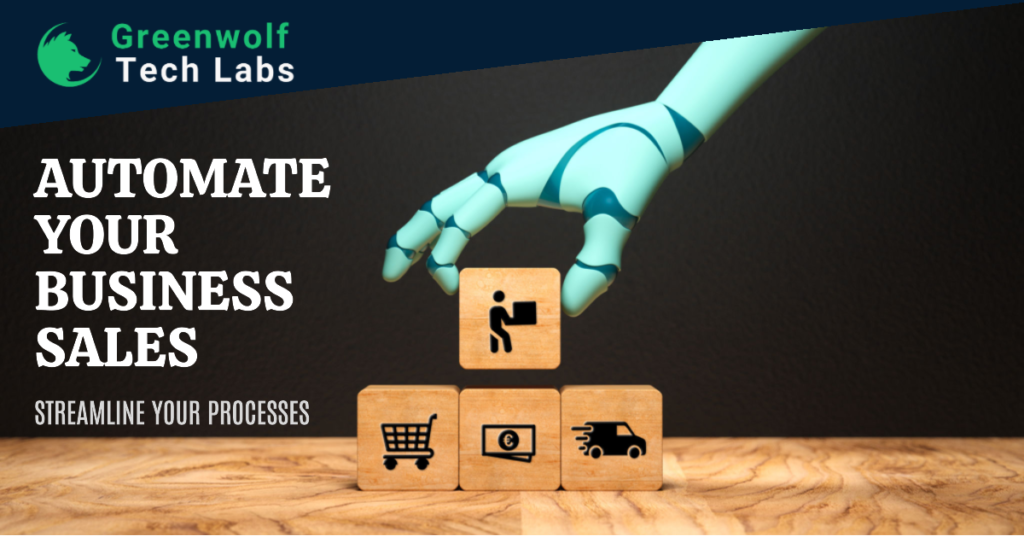In today’s fast-paced business landscape, sales teams are constantly seeking ways to streamline their processes and improve efficiency. This is where sales automation comes into play. Sales automation refers to the use of technology and software to automate repetitive sales tasks and optimize the sales process. By automating various aspects of sales, businesses can save time, reduce errors, and enhance productivity. While Business Automation, we have to do sales automation in business.
Benefits of Sales Automation in Business
Implementing sales automation in your business can provide several benefits.
Increased Efficiency and Productivity
Sales automation eliminates manual tasks, such as data entry, report generation, and follow-up emails, allowing sales representatives to focus on building relationships with prospects and closing deals. This increased efficiency leads to higher productivity levels within the sales team.
Improved Sales Performance
With sales automation tools, businesses can track and analyze sales data more effectively. This data-driven approach helps identify sales trends, target high-value prospects, and make data-backed decisions to improve sales performance.
Enhanced Customer Experience
Sales automation allows for personalized and timely communication with prospects and customers. By automating processes like lead nurturing, follow-ups, and customer onboarding, businesses can provide a seamless and consistent experience, leading to higher customer satisfaction and loyalty.
Streamlined Sales Process
Automating sales tasks, such as lead management, contact organization, and opportunity tracking, helps streamline the sales process. This reduces the chances of errors, eliminates bottlenecks, and ensures a smooth flow from prospecting to closing deals.
Types of Sales Automations Tools
There are various types of sales automation tools available in the market. Here are a few commonly used ones:
Customer Relationship Management (CRM) Software
CRM software is a foundational tool in sales automation. It helps manage customer data, track interactions, and streamline the sales pipeline. CRM systems provide a centralized hub for sales teams to manage contacts, leads, and opportunities effectively.
Email Marketing Automation
Email marketing automation tools allow businesses to create personalized email campaigns, automate follow-ups, and track email engagement. These tools help nurture leads and guide them through the sales funnel.
Sales Force Automation (SFA) Software
SFA software focuses on automating the sales process by providing tools for lead management, opportunity tracking, and sales forecasting. It helps sales teams manage their activities, collaborate effectively, and improve overall sales performance.
Workflow Automation Tools
Workflow automation tools enable businesses to automate repetitive tasks and create streamlined workflows. These tools can automate tasks like data entry, document generation, and notifications, reducing manual effort and increasing efficiency.
Choosing the Right Sales Automation Software
When selecting a sales automation software for your business, consider the following factors:
Business Needs and Goals
Assess your business requirements and identify the specific areas of the sales process that need automation. This will help you choose a software solution that aligns with your goals and addresses your pain points effectively.
Integration Capabilities
Check if the sales automation software integrates seamlessly with your existing systems and tools, such as CRM, email marketing platforms, and other business applications. Integration capabilities ensure smooth data flow and eliminate the need for manual data entry.
Scalability and Customization
Consider the scalability of the sales automation software. Will it be able to accommodate your growing business needs? Additionally, look for customization options that allow you to tailor the software to your specific sales processes and workflows.
User-Friendliness and Training
Choose a user-friendly sales automation tool that your sales team can easily adopt. Ensure that the software provides adequate training and support resources to help your team make the most out of the automation features.
Cost and ROI
Evaluate the pricing plans and subscription models offered by different vendors. Consider the return on investment (ROI) you expect to achieve from implementing the software and compare it with the costs involved.
Implementing Sales Automation in Your Business
To successfully implement sales automation in your business, follow these steps:
Define Your Sales Process
Start by mapping out your sales process and identifying areas that can benefit from automation. Break down the process into stages, from lead generation to closing deals, and determine which tasks can be automated.
Research and Select the Right Tools
Based on your requirements, research and select the sales automation tools that best fit your needs. Consider factors like functionality, integration capabilities, and ease of use.
Clean and Organize Your Data
Before implementing automation, ensure that your customer data is clean and organized. Remove duplicates, update outdated information, and segment your contacts for targeted marketing and sales efforts.
Train Your Sales Team
Provide comprehensive training to your sales team on how to effectively use the sales automation software. Focus on key features, workflows, and best practices to maximize their productivity.
Start with Pilot Projects
Begin by implementing automation in smaller segments of your sales process or with a pilot project. This allows you to test the effectiveness of the automation tools and make adjustments before scaling up.
Monitor and Optimize
Regularly monitor the performance of your sales automation processes and analyze the data. Identify areas for improvement, make necessary adjustments, and optimize your automation workflows for better results.
Overcoming Challenges in Sales Automation
While sales automation offers numerous benefits, it’s essential to address potential challenges:
Resistance to Change
Some sales team members may resist adopting automation due to fear of job loss or unfamiliarity with new technology. Address these concerns through proper training, emphasizing the benefits of automation, and providing ongoing support.
Data Integrity Issues
Automation relies on accurate and up to-date data. Ensure that your data is clean, accurate, and regularly updated to avoid issues with automation processes.
Integration Complexity
Integrating sales automation software with existing systems can be complex. Work closely with your IT team or seek assistance from the software provider to ensure smooth integration and data flow between different tools.
Overreliance on Automation
While automation can streamline processes, it’s crucial to maintain a balance between automation and human interaction. Some tasks, such as building relationships and providing personalized customer experiences, require a human touch.
Measuring the Success of Sales Automation
To measure the success of your sales automation efforts, track key performance indicators (KPIs) such as:
- Increase in sales revenue and conversion rates
- Reduction in manual data entry and administrative tasks
- Improvement in sales team productivity and efficiency
- Increase in customer satisfaction and retention rates
- Shortened sales cycles and faster deal closures
- Regularly analyze these metrics and compare them against your pre-automation benchmarks to evaluate the impact of sales automation on your business.
Future Trends in Sales Automation
As technology continues to evolve, several trends are shaping the future of sales automation:
- Artificial Intelligence (AI) and Machine Learning (ML)
AI and ML technologies are being integrated into sales automation tools to enhance predictive analytics, lead scoring, and personalized customer experiences. These technologies can automate routine tasks, provide real-time insights, and improve sales forecasting. - Voice and Chatbot Automation
Voice-activated assistants and chatbots are becoming increasingly popular in sales automation. These tools can handle routine customer inquiries, qualify leads, and provide instant support, freeing up sales teams to focus on more complex tasks. - Integration of Virtual Reality (VR) and Augmented Reality (AR)
VR and AR technologies have the potential to revolutionize sales processes by providing immersive product demonstrations, virtual showrooms, and interactive customer experiences. These technologies can enhance sales presentations and improve customer engagement. - Advanced Data Analytics
Sales automation tools will continue to evolve in their ability to analyze large volumes of sales data, providing deeper insights into customer behavior, sales trends, and market dynamics. Advanced analytics will enable businesses to make data-driven decisions and optimize sales strategies.
Conclusion
Sales automation offers businesses significant benefits, including increased efficiency, improved sales performance, and enhanced customer experiences. By choosing the right sales automation tools, implementing them effectively, and following best practices, businesses can streamline their sales processes, achieve higher productivity levels, and drive revenue growth. Embracing the future trends in sales automation will further empower businesses to stay ahead in the competitive market. Start exploring sales automation solutions today to unlock your business’s full potential.
FAQs




